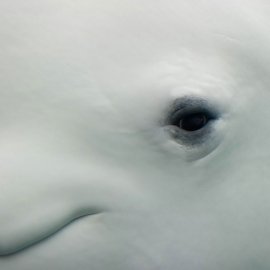Whales in Captivity
-
-
ListenPause
I’m Peter Neill, Director of the World Ocean Observatory. Whales are the great symbol and reality of a healthy ocean. As such, they capture our imagination and engage us directly in their vitality and conservation. There are myriad whale-related issues is discussion today: the continuing hunting of whales, particularly by the Japanese; the impact of seismic testing on whale navigation and migration; the frequent, inexplicable stranding of whales ashore; and the survival of whales in captivity, either in aquariums or entertainment spectacles like Sea World and others. This latter has been further stimulated by the recent death of several Orca whales in such places and the growing controversy over the morality of their captivity and exploitation. In December 2015, Wilfred Moore, a Senator from Nova Scotia, introduced a bill in the Canadian parliament entitled Ending the Captivity of Whales and Dolphins Act to modify the Canadian Criminal Code “respecting cetaceans in captivity,” and to strengthen the Wild Animal and Plant Protection and Regulation of International and Interprovincial Trade Act to prohibit the import and export of cetaceans in Canada. The legislation is very specific, expanding the definition of cetacean to include whales, dolphins, and porpoises, extending the offense to anyone who owns, has the custody of, or controls a cetacean in captivity, or breeds a cetacean, or possesses or seeks to obtain reproductive materials of cetaceans, including sperm and embryo. It excepts ownership of cetaceans already in captivity or in care or rehabilitation from injury or other distress. An indictable offense is liable to imprisonment of not more than five years, and a summary conviction is liable to a fine not exceeding $10,000, or a term not exceeding 18 months, or both. The amendments to the other Acts prohibits the movement of an animal into captivity unless in distress, and the import/export of cetaceans, living or dead, in Canada, including reproductive materials. Recently, in the United States, a California Congressman, Adam Schiff, announced his intention to introduce federal legislation with comparable intent, specifically to phase out Orca whales from aquatic parks by prohibiting the future taking of animals from the wild or breeding in captivity for the purpose of public display. According to a report by CBS Moneywatch, the California Coastal Commission approved last year, a $100 million expansion of tanks owned by SeaWorld, an entertainment company, to hold Orcas in San Diego, but “included conditions, including a ban on breeding and the prohibition of the sale, trade, or transfer of the whales.” This controversy will continue, pitting commercial entertainment interests claiming educational and scientific purpose against animal rights organizations claiming commercialism and cruelty to animals. For myself, I once had the privilege of travelling to Hudson Bay in Canada where, near Churchill, each year thousands of Beluga whales congregate to breed and nurture their young. The sight from the air is extraordinary, with animals everywhere. Better still was the experience in a tired rubber outboard with a local native guide and a boom box with a microphone on a wire trailing behind and amplifying the underwater chatter and song. As we motored quietly along, the whales swam up alongside, resting their heads on the pontoon, their flanks to be stroked, their faces innocent with that Beluga smile, and their eyes bright with a vitality that explains the anthropomorphic identification between such animals and indigenous peoples who live among them. I confess I was the one captivated. In that single encounter, my access to the marine world opened directly, a clear vision that was for me formative and unforgettable. Call me emotional, but, from that day, I have worn a pewter pin of a Beluga whale on my vest as an evocation of that connection between brothers. Impossible I suppose, but I would want anyone and everyone to have shared that experience of a whale in the wild, and free. Tricks, in captivity, do not serve. Surely, yes, without a privileged trip to Hudson Bay, there must be a way to communicate the grace and intelligence of cetaceans to a wider audience without trivializing their behavior or denying their natural lives. We will discuss these issues, and more, in future editions of World Ocean Radio.
There are many whale-related hot button topics being discussed today: hunting (particularly by the Japanese), seismic testing, inexplicable strandings, the ingestion of plastic pollution, and the growing controversy over the morality of their captivity and exploitation. In this week's episode of World Ocean Radio host Peter Neill discusses the practice of keeping cetaceans for their entertainment value and explores new and proposed bills and legislation in both Canada and the United States which will help to protect cetaceans in captivity, further strengthen existing Acts to prohibit their import and export, to phase out Orcas from entertainment parks, and to modify the criminal code to prevent the taking of cetaceans such as whales, dolphins and porpoise from the wild or to breed those in captivity.
About World Ocean Radio
Peter Neill, Director of the World Ocean Observatory and host of World Ocean Radio, provides coverage of a broad spectrum of ocean issues from science and education to advocacy and exemplary projects. World Ocean Radio, a project of the World Ocean Observatory, is a weekly series of five-minute audio essays available for syndicated use at no cost by college and community radio stations worldwide. A selection of episodes is now available in Portuguese, Spanish, French, Swahili, and Mandarin, enabling us to reach 75% of the world's population. For more information, visit WorldOceanObservatory.org/world-ocean-radio-global.
Image
From the Mystic Aquarium's "Beluga Encounter" exhibit.
From their site:
"Mystic Aquarium is a leader in beluga research, care and training. Through long-standing animal care and research relationships with other institutions across the nation, Mystic Aquarium has been selected to house belugas from other leading facilities for various reasons, including breeding initiatives, exhibit renovations and research." Visit them online at MysticAquarium.org.
- Login to post comments



